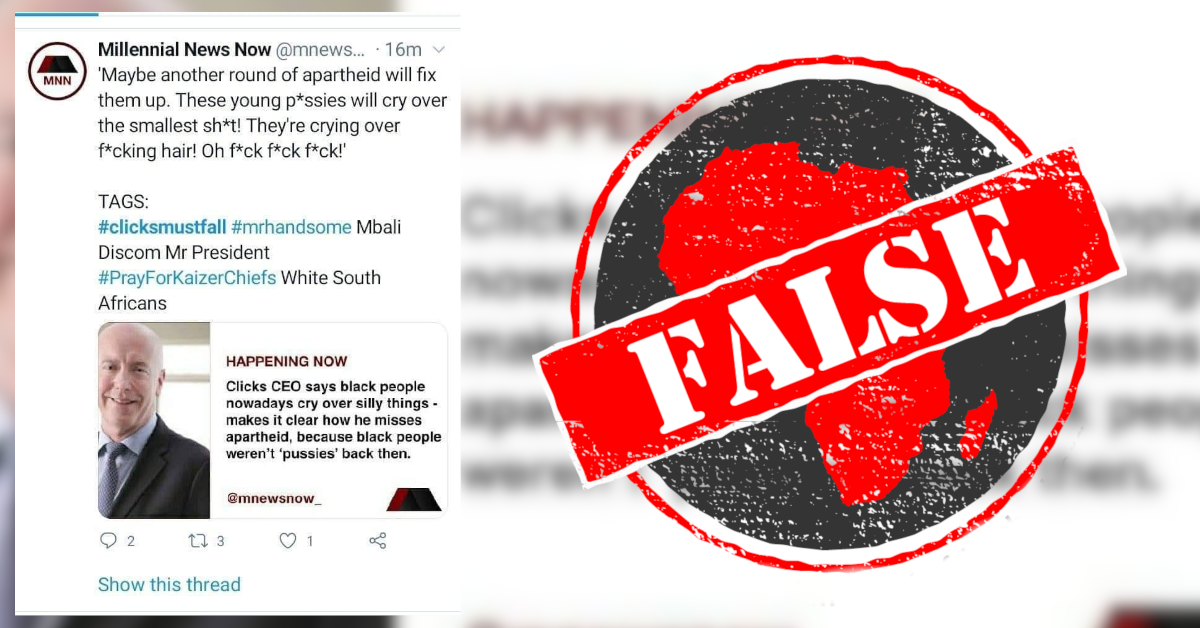The tweet shows a photo of a middle-aged white man. Text next to the photo reads: “Clicks CEO says black people nowadays cry over silly things - makes it clear how he misses apartheid, because black people weren't ‘pussies’ back then.”
The screenshot has been viewed more than 250,000 times.
Clicks, a South African retailer, has been under fire since early September for an advert in which a white woman’s hair is described as “normal”, while the hair of black women is labelled “frizzy and dull” and “dry and damaged”.
“Let them try we will show you flames,” one user wrote when posting the tweet. Another said: “Clearly that Marketing strategy was Purposely done.”
The Economic Freedom Fighters, a major opposition party, has called for Clicks stores to be shut down. The hashtag #Clicksmustfall has been trending on Twitter in South Africa since Friday 4 September.
But did the CEO of Clicks really say the words attributed to him in the tweet? And is the photo of the CEO?

Satire + news = disinformation
The screenshot is of a tweet from Millennial News Now, with the Twitter handle @mnewsnow_. The account describes itself as “Africa's leader in alternative facts”. And a pinned tweet makes it clear its information should not be taken seriously: “All MNN headlines, statements, and articles are based purely on fiction. Millennial News Now is a satire account and does not represent or claim to represent a legitimate news outlet.”
Disclaimer:
All MNN headlines, statements, and articles are based purely on fiction. Millennial News Now is a satire account and does not represent or claim to represent a legitimate news outlet.
— Millennial News Now (@mnewsnow_) August 18, 2020
Africa Check has seen the tweet, but it has since been deleted from MNN’s feed.
The tweet was real, but satire – or at least, an attempt at humour. And satire shared as real information becomes disinformation.
‘Apologise unreservedly’
The photo in the tweet shows the former CEO of Clicks, David Kneale, who stepped down in 2018. The current chief executive is Vikesh Ramsunder, who has been widely quoted in the media since the ad went viral.
Clicks has since apologised and removed the ad. In a statement, Ramsunder said: “I apologise unreservedly for the hurt and anger these images have caused.”
We have made a mistake and sincerely apologise for letting you down. We recognise we have a role to play in creating a more diverse and inclusive S.A, starting with our website content. We know we need to do better, and commit to ensuring our content better reflects this value.
— Clicks (@Clicks_SA) September 4, 2020
On 4 September, Clicks tweeted: “We have made a mistake and sincerely apologise for letting you down. We recognise we have a role to play in creating a more diverse and inclusive SA, starting with our website content.” – Naledi Mashishi
Republish our content for free
For publishers: what to do if your post is rated false
A fact-checker has rated your Facebook or Instagram post as “false”, “altered”, “partly false” or “missing context”. This could have serious consequences. What do you do?
Click on our guide for the steps you should follow.
Publishers guideAfrica Check teams up with Facebook
Africa Check is a partner in Meta's third-party fact-checking programme to help stop the spread of false information on social media.
The content we rate as “false” will be downgraded on Facebook and Instagram. This means fewer people will see it.
You can also help identify false information on Facebook. This guide explains how.


Add new comment